
We have done thousands of dental bridges and implants and root canals. We have no financial bias in how your tooth is replaced. Bridges, Implants, we offer both services. We want to offer the best tooth replacement options for you and that is it. This article is our opinion based on years of private practice experience. In this article we compare the advantages of getting a tooth bridge or implants in this article. In most cases it is much better to get a dental implant than a tooth bridge for reasons that will be evident after you read this article. Please give us feedback.
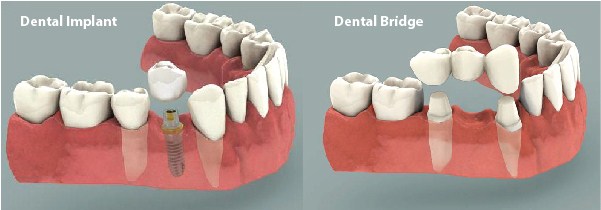
dental implants vs bridge
Meet Dr. Adams

Contact Us for a dental implant consultation
Dental Implants vs Tooth Bridge Video
A Deeper Dive into the Pros and Cons of Implants and Bridges
Implants do not harm existing teeth by drilling them down, connecting teeth, and gluing fake teeth to other existing teeth. Dental bridges use existing teeth to support fake replacement teeth. One advantage of bridges is they can be made very quickly and they do stay in the mouth permanently. A tooth bridge is when new teeth are glued to and supported by existing teeth.
For example, a three teeth bridge can be glued to two teeth. There are situations when a traditional bridge is the best method to replace a tooth. But in general, implants are a better option for replacing teeth compared to bridges. Implants last longer than bridges. And implants in many cases also cost less.
Cases When a Bridge is a Better Option than Dental Implants:
- Some people are not good candidates for dental implants
- If teeth in the mouth already need crowns, getting a bridge is a much more cost effective option. For example if a tooth is missing and the adjacent teeth need crowns, a bridge or two crowns and an implant are the treatment options. In this case the bridge will cost $6000-$8000. An implant and two crowns will cost $8000-$10,000. The second treatment plan is a much better option and will last longer, but the bridge is much more economical.
- Bridges usually fail due to decay. Teeth involved in a bridge are connected and cannot be flossed like individual teeth. More difficult hygiene for bridges makes them more susceptible to decay. One area of decay and the entire bridge needs to be replaced.
Dental Implant vs Bridge Video Animation
What is a Dental Implant?
A dental implant replaces a tooth by literally adding a new tooth root and crown into your mouth. Implant replacements co-exist with natural teeth and look, feel and function the same as their natural teeth counterparts. Maintenance such as brushing and flossing around implants is the same as around natural teeth. Bridged teeth require special floss called super floss and Waterpiks.
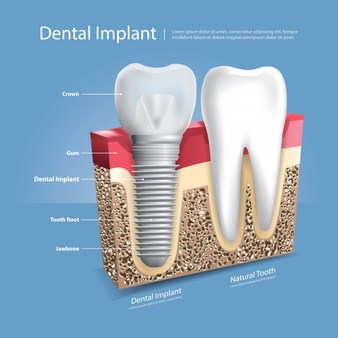
implant 3
Advantages of Getting an Implant instead of a Natural Tooth Bridge
- Implants do not put pressure and connect to natural teeth
- Successful implants prevent bone and gum loss
- Maintenance such as brushing and flossing is the same as regular teeth
- Implants feel similar to natural teeth and not thick or bulky.
- Replacing teeth prevents teeth shifting and a bad bite
- Implants do not decay, get cavities or need root canals
- Dental implants rarely crack or break like natural teeth
- Implants cost less than bridges when replacing a single tooth
What is a Dental Bridge?
A bridge is where missing teeth spaces are filled by connecting fake teeth to natural teeth. A bridge procedure typically requires drilling at least 1mm off the outer layer of the natural teeth. Bridges provide stability and prevent teeth from shifting and collapsing into missing teeth spaces. Bridges feel different since teeth are connected and can no longer be flossed individually.
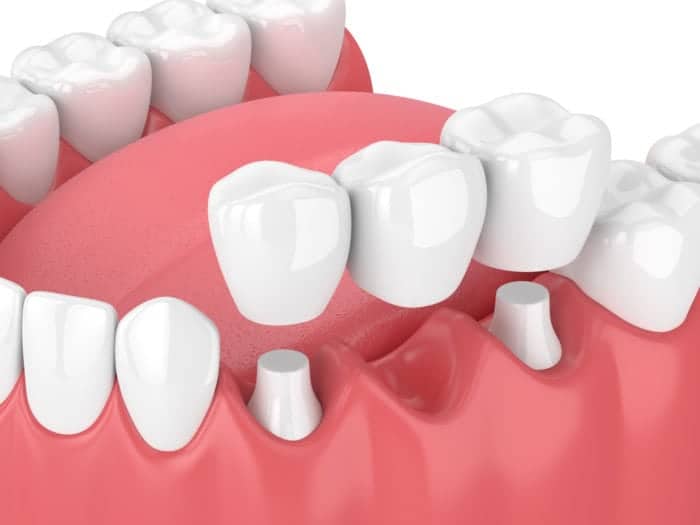
tooth bridge what is
Dental Bridge Cost vs Implant Cost?
For replacing one tooth, a dental bridge costs about as much as three crowns. In the Washington DC metro area, the cost of a dental bridge is about $5000. The cost of replacing a single tooth with a dental implant is $4500 on the average.
How Long do Dental Implants and Natural Teeth Bridges Last?
Yes, on the average bridges last 5-13 years. Dental implants can last a lifetime. Bridges are more susceptible to failure than implants. Bridges are susceptible to cavities, gum disease, fracture, and root canals. Implants do not have nerves. They do not decay. And implants present little risk to gum disease or fracture.
Implant and Dental Bridge Procedures
- Bridge procedures can be completed in 2-3 weeks and two trips to the dentist. Replacing a tooth with an implant usually takes 3-6 months and 3-5 trips to the dentist.
- Teeth need to be drilled down by 1mm or more and connected with spans of false teeth
- Bone is lost when teeth are removed and not replaced. Tooth function stimulates bone vitality and proliferation. Use it or lose it.
- Bridges are more difficult to clean because teeth are connected. Regular flossing cannot be done.
- Teeth involved in bridges decay more easily since they are connected and more difficult to clean.
- Bridging teeth prevents them from moving
- Teeth involved in a bridge can fracture due to more force placed on fewer teeth. Teeth are being leveraged to replace missing teeth.
- Teeth in bridges are at increased risk for needing root canal therapy. Heavier biting forces can cause nerves in teeth to die.
- Bridges usually do not last as long as dental implants
- Bridging teeth leads to more tooth loss. Then what? A bigger bridge or more implants?
For people with metal allergies and sensitivities, zirconia implants made of ceramic are an option.
When is it Better to Do a Dental Bridge Instead of an Implant
- When a dental implant is not possible.
- In cases where the patient has a bone disease
- In the event of uncontrolled systemic disease such as unstable diabetes
- When your insurance company pays for bridges and not implants. And you cannot afford to pay for a dental implants. Beware when the bridge fails you will lose more teeth and replacement costs will get a lot more expensive.
Does Dental Insurance Pay for Implants and Bridges
Most dental insurance companies have benefits for tooth replacement. Most modern insurance companies have benefits for implants and bridges. Coverages always come down to individual policies and should be verified prior to any dental or medical procedure. Coverages have nothing to do with cosmetic vs non cosmetic procedures. Tooth replacement is necessary. Some dental plans are limited with waiting periods and monetary annual limits.
Why it is Necessary to Replace a Missing Tooth
- Teeth can shift and the bite can go bad. Bite collapse.
- Tooth wear and breakage because of imbalanced and uneven biting forces around the area of the missing tooth or teeth. Bad bites can lead to tooth clenching and grinding. How to stop teeth clenching at night.
- Bone loss and gum disease especially near where teeth have been lost.
- Food trapping in areas where teeth are missing. Gum disease may develop as teeth shift and more spaces open up for food and bacteria to get stuck.
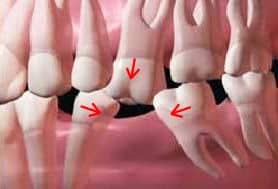
bad bite
Teeth Bridges cause more tooth loss
Research has shown that dental bridges will typically last 5-10 years. Bridges typically fail with the loss of another tooth and the need to bridge even more teeth or get an additional implant. For the loss of a tooth involved in a bridge:
- Now there will be the need for more teeth to be replaced and a bigger less favorable bridge or 2-3 implants instead of one had an implant been done from the beginning.
- Bone grafting will likely be necessary because a tooth has been lost for a long time
- Crowns will be needed for any teeth surviving a bridge failure
- Or maybe 3 implants if all teeth in the bridge are lost
Implants Last Longer Than Bridges
Dental Implants in the long run cost less than bridges because a bridge will eventually fall apart, resulting in the need for more dental implants. Bridges usually costs about as much as 3 crowns. One implant costs less than a 3 tooth bridge. Unless there is a reason why someone cannot receive a dental implant, there is no good reason to get a bridge. Implants now come in metal-free zirconia in the event of a metal allergy.
The dental implant is the best way to replace teeth. Bridges normally lead to bone and gum loss, poor cosmetic results, tooth decay / caries and more tooth loss. Research shows that 60% of all dental bridges fail during the first 10 years. Dr. Adams does implant teeth from start to finish. Teeth can normally be replaced from start to finish in 2-3 months in 2-3 short appointments.
Implants can also be used for bridges. And options to replace all teeth with implants exist:
What are the Leading Causes of Teeth Loss?
- Tooth decay as a result of irregular brushing & cleaning habits, excessive intake of sugar containing sticky foods, carbonated beverage consumption like Coca Cola, Pepsi, energy drinks etc and neglected oral hygiene,
- Dry mouth can cause tooth damage. Drink plenty of water and rinse your mouth as much as you can to prevent tooth loss,
- Gum diseases,
- Old age,
- Excessive cigarette smoking habit,
- Never visiting a dentist for professional dental care,
- Diseases like Diabetes Mellitus.
What Happens if Missing Teeth are not Replaced?
- Problems with eating, drinking, speech & basic activities involving teeth,
- Shifting and tilting of teeth in empty spaces created by lost teeth,
- Over-eruption of opposing teeth causing elongated appearance and eventually loosening and mobility of teeth,
- Problems in bite,
- Loss of jawbone.
Who is a candidate for Dental Implants
Basically anyone who needs teeth replaced and who does not have unstable diabetes or any other unstable medical condition. Some people may not have enough bone for implants, but bone grafting procedures can be done to grow more bone. Most of the time implants are the best way to replace teeth. Occasionally teeth bridges may be cheaper, but the will not last as long and when they fall apart, more implants will be necessary.
Who is a candidate for a Bridge?
Anyone who has existing teeth and some missing teeth, can get a bridge. As stated above, usually getting an implant is better, but in certain situations getting a bridge may be considerable. Such as if insurance pays much more of the bridge than the implant. Or if the teeth in the mouth already need crowns and are not virgin teeth. An older person may opt for a bridge because the bridge may outlast them. Also, with age comes more medical problems.
Teeth Bridge Before and After
Dental bridges connect teeth. A dental bridge is two natural teeth drilled down and three connected crowns are glued to the teeth. An Implant is a process where a new root is implanted and a crown is connected to the new implant root.
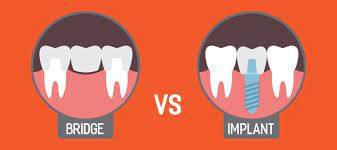
brige vs implant 2
Dental Implant Before and After
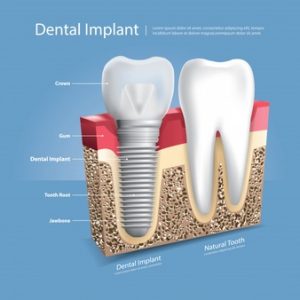

 (301) 421 1996
(301) 421 1996 burtonsvillesmiles@gmail.com
burtonsvillesmiles@gmail.com